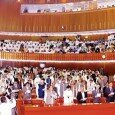By Qamar Zaman –
Domestic Violence Bill (Prevention and Protection) 2009 on bumpy road over interpretation of ‘family values’
Pakistan won its first Oscar this year — an honour that portrayed its ugly face in gruesome, if realistic way. The evil of domestic violence is known but our male chauvinist society has disregarded it to such an extent that it is not even realized. The Annual Report of Aurat Foundation says an overall 6.74 percent increase in incidence was recorded during 2011.
According to the data, there was a 48% increase in sexual assault cases, 37% jump in acid throwing, 26% hike in ‘honor killings’ and 25% rise in domestic violence.
In the backdrop of such dismal statistics, the passage of a government bill to create a powerful National Commission on the Status of Women in January this year appeared as the most significant pro-women move in nearly four years of the sitting National Assembly, raising the hopes of rights activists.
However, any sincerity with the cause appeared short-lived as another pro-women legislation to curb the menace of domestic violence did not meet the same success.
A last minute glitch is blamed for throwing a landmark bill, seeking to deter all forms of domestic violence against women, into limbo but the issue is not that simple.
The factors, which actually triggered the controversy and culminated in a deadlock over the passage of Domestic Violence Bill (Prevention and Protection) 2009 are yet to be identified.
The PPP known for its pro-women policies, surrendered before the strong opposition of PML-N and JUI-F when Khurshid Shah announced, “We will not pass this bill till we develop consensus”
Passed by the National Assembly on August 4, 2009, “The Domestic Violence (Prevention and Protection) Bill, 2009,” had lapsed after 90 days when the Senate returned it with some objections. The only option left, as per rules of business, to turn it into a law was a presentation in a joint session of the parliament.
Six joint sessions of the parliament were convened after its lapse (90 days) but the government remained oblivious and it never surfaced due to other considerations.
A couple of years later, the Bill appeared on the agenda of the 12th Joint Session of the parliament on March 20 this year only to go in cold storage again after exchange of heated arguments.
The debate — supposedly to fine-tune the bill —did not remain within the premises of House and spilled over into the streets where slogan chanting civil society members and charged women rights activists championed the cause as vociferously as those who opposed its passage.
The opponents say the proposed bill will harm family structure whereas its advocates claim it is a shield against violence and would protect women and children. It was perhaps, the first incident of its kind wherein rights activists entered the committee room where the bill was under discussion.
Rights activists chanted slogans in favour of the passage of the bill and religious activists responded in the same coin to oppose it. Harsh words were traded by both sides during demonstrations when the matter drifted out of control.
Jamiat Ulema-e-Islam led by Maulana Fazlur Rehman and Pakistan Muslim League-Nawaz emerged as critics of the bill and the civil society representatives as its ardent supporters.
The PML-N says its objections were more procedural than conceptual, however, the JUI-F chief claimed the bill promoted western culture and values rather than Islamic ones. He was quoted as saying, “the NGOs continue to promote culture, which keeps women away from Islam and that is not acceptable to us.”
The JUI-F chief described it as an effort to destroy the dignity of women in Islam and urged followers to stand united against those who wanted to impose Western culture in Pakistan.
Seemingly helpless, the Pakistan People’s Party known for its pro-women policies, surrendered before the strong opposition of PML-N and JUI-F when PPP senior minister Khurshid Shah announced, “We will not pass this bill till we develop consensus on the issue.”
 Yasmeen Rehman from the PPP, the member in-charge of the bill, recalls the day when special committee headed by then-Religious Affairs Minister Syed Khursheed Shah was in the middle of a discussion when some rights activists interrupted the meeting. “They (rights activists) should not have come,” she lamented, saying the Maulana had come prepared and was ready to discuss the pros and cons of the bill but he walked out.
Yasmeen Rehman from the PPP, the member in-charge of the bill, recalls the day when special committee headed by then-Religious Affairs Minister Syed Khursheed Shah was in the middle of a discussion when some rights activists interrupted the meeting. “They (rights activists) should not have come,” she lamented, saying the Maulana had come prepared and was ready to discuss the pros and cons of the bill but he walked out.
According to the rules, aliens are not allowed to attend the parliamentary committee meetings and Khursheed Shah had rightly pointed out that those in attendance could not sit there.
The National Assembly Speaker had also ordered an investigation to determine how the women managed to cross security cordons and reach the Committee Room, where the unpleasant incident took place and annoyed the JUI-F chief.
Mrs Rehman then solved the puzzle and revealed one of the committee members had escorted them but in goodwill since they (right activists) were staging a demonstration outside the Parliament House.
Afterwards, attempts to woo Maulana Fazlur Rehman did not yield any result. “I visited the Maulana to persuade him but he was in no mood to return,” Mrs Rehman added. Months later, during the budget session, Mrs Rehman says she approached him again for his return to the committee.
“He (Maulana Fazlur Rehman) asked me to convene the meeting, saying, he was ready to start work again from that very point of deadlock,” Mrs Rehman added.
While commenting about the concerns of JUI-F, she explained they did not object to every single clause of the bill but were concerned over sections, which empower victims to lodge complaints against their own family members, which according to them “will jeopardize the sanctity of family values.”
The bill has proposed the establishment of a protection committee in every Tehsil comprising, “one police officer male or female of the rank of Sub-divisional Police Officer, a female SHO and two women councilors from the concerned Tehsil Council and the Protection Officer, who shall also act as the Secretary of the Protection Committee.”
Proposed functions of Protection Committee
The functions of the committee have been delineated under the Clause 15 which says “The Protection Committee may; (a) inform the aggrieved person of her or his rights provided under this Act or any other law for the time being in force and the remedies and the help that may be provided;(b) assist the aggrieved person in obtaining any medical treatment necessitated due to the domestic violence; (c) if necessary, and with the consent of the aggrieved person, assist the aggrieved person in relocating to a safer place acceptable to the aggrieved person, which may include the house of any relative or family friend or other safe place, if any, established by a service provider; (d) assist the aggrieved person in the preparation of and filing of any application or report under this Act, the Code or any other law for the time being in force; (e) file an application for a protection order, if so desired by the aggrieved person; (f) coordinate with Family Conciliatory Committee in performing its duties; and (g) keep official record of the incidents of domestic violence in its area of jurisdiction, whether on the basis of information received or suo moto inquiry, irrespective of whether or not action is taken under this Act. Such record shall include: (i) the first information received about the incident of domestic violence; (ii) the assistance, if any, offered or provided by the Protection Committee to the aggrieved person; (iii) where applicable the reason for not taking action under this Act when an incident was brought to the notice of the Protection Committee; (iv) where applicable, the reason for the aggrieved persons refusal to take assistance from the Protection Committee.”
While commenting on the objections of PML-N, she said the amendments proposed by Zahid Hamid from the PML-N were justified, adding, the bill was drafted prior to the passage of 18th Constitutional Amendment, therefore, necessary amendments have been incorporated.
Mrs. Rehman expressed surprise over the paradoxical approach of the stakeholders, saying “Everyone denies opposition of the bill, already passed by the National Assembly in 2009, but is expressing concerns at the same time.”
Referring to another bill of former Senator Nilofer Bakhtiar passed on the last day of the last session prior to March elections, Mrs Rehman said the bill was almost similar to hers [The Domestic Violence (Prevention and Protection) Bill, 2009] and has been referred to the relevant standing committee.
“Let’s hope anyone of these legislations is passed,” she said, keeping in view that a joint session of the parliament, mandatory for the passage of her bill, was in sight in the near future.
On the other hand, women rights activist Farzana Bari indentified political consideration as the sole factor for procrastination. “They play politics over issues related to women to promote their (religious leaders) politics,” she said.
They (the opponents) are of the view that children should not be given the right to launch a complaint to the police as they believe it would destroy the family system, she said.
According to the definitions given in the bill an “aggrieved person” means any woman, child, man or any vulnerable person who is or has been in a domestic relationship with the accused and who alleges to have been subjected to any act of domestic violence.
And an “accused” means a person who is or has been in a domestic relationship with the aggrieved person and against whom the aggrieved person has sought any relief under this Act.
Bari went on to say that children’s right to lodge a complaint is really disturbing for those who are opposing it. “They take it as equating the society with Western culture,” she added.
Given the challenges of the incumbent government, the chances for a special joint session for the purpose remain slim.































































































